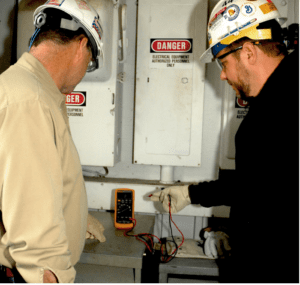 Over the last five-plus years of presenting Electrical Safety Training (NFPA 70E), I have had the opportunity to walk into a wide variety of facilities from food production, machinery manufacturing, pipeline maintenance, packaging – the list goes on and on. A very common question asked of me is “who should be in the electrical safety training class?” I will reply by referring to OSHA 1910.332 – Table S-4, which essentially states anyone exposed to 50 volts or more and those that supervise anyone exposed to 50 volts or more should be trained. The obvious folks mentioned here are the front-line electricians and maintenance workers as well as their supervisors.
Over the last five-plus years of presenting Electrical Safety Training (NFPA 70E), I have had the opportunity to walk into a wide variety of facilities from food production, machinery manufacturing, pipeline maintenance, packaging – the list goes on and on. A very common question asked of me is “who should be in the electrical safety training class?” I will reply by referring to OSHA 1910.332 – Table S-4, which essentially states anyone exposed to 50 volts or more and those that supervise anyone exposed to 50 volts or more should be trained. The obvious folks mentioned here are the front-line electricians and maintenance workers as well as their supervisors.
One group that often does not take the training are the safety professionals – your EHS Managers and Coordinators, Safety Compliance Managers and the many other names that refer to the safety folks in a facility. I recently asked a Safety Manager why she was not going to take the class with the maintenance folks and she kind of laughed while stating, “I don’t do that stuff!”
I was a bit perplexed by that statement. Safety professionals are tasked with getting the staff trained in the variety of hazards they are required to work around, and many of those tasks are rarely performed by the safety professional themselves. They train the employees to the OSHA standards and any company specific rules, but you will rarely see a safety professional enter a confined space, for example.
Many safety professionals are not very strong on electrical safety. Using myself as an example, in my previous job at a large food production facility, whenever Electrical Safety Training was offered, I took the class. No, I did not intend to go wire up a 480V motor or anything, but I needed to know what our employees needed to be able to perform their job safely and what we should NOT be doing. I took the class three times within five years at that previous job.
From OSHA’s General Duty Clause – all employers provide a work environment “free from recognized hazards that are causing or likely to cause death or serious physical harm.” Taking the class will at least help those safety professionals recognize the hazards.
